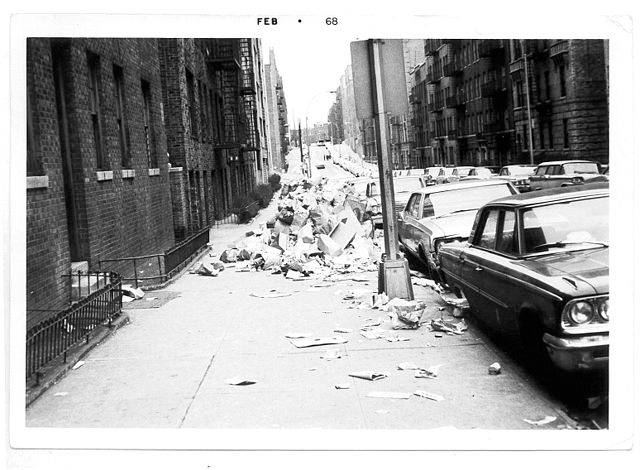February 2, 1968

Image from Wikimedia Commons. Licensed under Creative Commons.
The sanitationmen request a $600 salary increase, a Monday-Friday workweek, 1.5x salary on Saturday, 2x salary on Sunday, a 10-cent night differential, and a new one year contract. The city mediators’ current proposal is a $300 increase ($100 retroactive from Jan 1, 1967), 2x salary on Sunday (retroactive from July 1, 1967), an additional 2.5% payment by the city to the employee pension, and a 15-month contract.
Prior to his meeting with Mayor Lindsay , the sanitationmen’s leader, John J. DeLury, found the sanitationmen’s anger directed at him – including a thrown egg – for advocating a strike vote by mail. However, the crowd greeted him with applause after his meeting when they learned he resubmitted the strikers’ demands. After learning the demands were refused by the city, Mr. DeLury responded by telling the crowd “no contract, no work,” and he was met with cheers when he shouted, “I accept the motion for go-go-go!”
In addition to the city’s refusal of Mr. DeLury’s demands, the City Corporation Counsel sought a temporary restraining order under provisions of the Taylor Law, which prohibits strikes by public employees. The law allows for fining a union and for revoking a union’s right to dues checkoffs by the employer. Union leaders may also face fines or jail-time if found in criminal contempt of a court order regarding the law. Mayor Lindsay hopes the sanitationmen will respect the law and considers the work stoppage “an emergency situation” that should see public interest as the priority.
Whether legal action will be effective in averting a lengthy strike remains to be seen, but Sanitation Commissioner Maurice M. Feldman stated “approximately 99 per cent” of those scheduled to work failed to show up. A quick resolution may be unlikely as a union official remarked, “Things have got to simmer a little.” A short simmer would be best because while the most recent sanitation strike lasted for only 2 days, those 2 days saw 16,000 tons of refuse pile up. Until the strikers and city can reach a resolution, it appears there will be no residential garbage collection throughout the five boroughs, which will leave the citizens and garbage to simmer.
Source:
Stetson, Damon. “Sanitation Strike Begun by 10,000 – City Obtains Writ.” New York Times, Feb. 3, 1968






